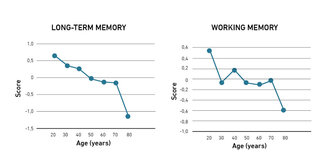Smartphones, internet, TV. In the age of information overload, it is becoming increasingly difficult to filter out the unnecessary and to focus on what really matters. To find out which tips and tricks you can use to sharpen your thinking and which micronutrients nourish your ability to concentrate, click here.
Why our brains are working even harder today
Our world has changed dramatically over the last 130 years. Many innovations have made our daily lives easier. Nevertheless, modern life can overwhelm us at times. To-do lists and deadlines fill our thoughts. Everyday life is becoming increasingly complex and more information laden. In Germany alone, there are more than 85 kinds of toilet paper to filter, sort and choose from, which illustrates the flood of stimuli and information that people today have to battle with.
To avoid being swamped by permanent stress and stimulus overload, you have to be able to concentrate – it is important not to lose focus, to maintain mental performance, and to know what the potential threats to your concentration are.
Disruptive factors: What can affect concentration?
- The flood of stimuli and information: frequent use of mobile phone, tablet, computer, TV, etc.
- Mental overload: chronic stress, work/and personal overload, mental problems
- Lack of sleep and fatigue: lack of sleep favours poorer concentration
- Lack of exercise: results in reduced nutrient and oxygen supply
- Lack of motivation: encourages your thoughts to wander and makes it difficult to get the to-dos done
- Many interruptions: create stress and frustration and inhibit concentration
- “Defer-itis”: a motivational thief that generally makes concentration difficult
How long can children and adolescents concentrate?
The length of time children can stay focused on an activity depends on their age. But the child’s individual development, interests and personality also play a role. The average time span for focused concentration is...
- at age 5-7 about 15 minutes.
- at age 7-10 about 20 minutes.
- at age 10-12 about 20-25 minutes.
- at age 12-14 about 30 minutes.
So the attention span of children is still limited. Therefore, children should not be forced to sit at a desk for hours, but allowed short breaks so that they can indulge their natural desire for movement. This helps them to approach the tasks they have to accomplish with renewed enthusiasm.
Why children's eyes don't miss a trick.
While adults can focus on what is important to them, children’s eyes are constantly noting what is going on around them. This wide range of attention helps them to gather a lot of information and to learn a lot just by looking
How can you improve children’s concentration?
Children are very quickly distracted by environmental stimuli. It is all the more important to provide them with the necessary calm and a learning atmosphere during concentrated head work.
Mental support
Today’s children’s have to cope with tremendous pressure for time and performance. Threats, anxiety, and pressure can take the pleasure out of learning and disrupt a child’s concentration. Encouraging words and time for carefree childhood pursuits, on the other hand, help youngsters to feel calmer and safer – an important basis for freeing their minds to learn.
Reduce stimuli of a visual nature
Playing siblings, toys lying around, or parents doing housework are all visual stimuli that can easily distract children from their tasks.
Reduce stimuli of an acoustic nature
Acoustic stimuli, such as a crying sibling, street noise, or a loud TV in a next-door room, can also rob children of concentration. If the noise source cannot be eliminated, earphones can be useful as a last resort.
Playful exercises
A child’s ability to concentrate can also be supported by play. In addition to special exercise books and training blocks for school and kindergarten children, other sources of fun can also sharpen the child’s focus. For example, these include...
- ... playing memory and parlour games
- ... memory games (e.g. “I’m packing my suitcase”)
- ... puzzle tasks, “spot the mistake”
- ... skills games such as pick-up sticks
- ... being read to or self-reading for school children
- ... telling the day backwards
- ... mindfulness exercises such as watching the clouds or the wind in the leaves
How long is an adult able to concentrate?
Even average adults can usually concentrate for only about 20 minutes at a time. Why? If we are dealing with one thing in an intensive manner, the information is stored as protein chains in our working memory. Since space here is limited, the protein chains begin to decompose after about 20 min and the information is lost. Permanent storage occurs only when information is stored in the long-term memory.
Practice tip: Take breaks according to your biorhythms.
Adult mental performance is governed by a 90-minute rhythm. After just over 1 hour of focused work at the most, we switch to standby mode for approx. 20 min. During this time we are less alert and focused, so this makes the perfect time to take a break and give your brain a breather.
How do memory and concentration change with age?
As people age, the speed of all their mental processes decreases continuously. This development can be observed from younger adult age. Deterioration in long-term memory and working memory are most pronounced, especially from the 70th year of age, when a drastic decline can be observed.

But not all concentration skills are reduced in healthy senior citizens. For example, studies by the Memory Centre at Jena University Hospital show that healthy senior citizens are still very well able to focus on what is important and use cues that improve their perception and attention. And crystallised intelligence, which depends on acquired knowledge and experience, even increases with age.
How can you increase your concentration?- 10 tips for more focus at school, study, in your profession and at advanced age.
Being able to focus is a valuable gift. But not everyone is blessed with strong concentration skills. The good news is that concentration can be trained and supported in other ways:
1. Vitamins and minerals for the brain:
In order for our brain to work at maximum capacity, it’s important to be aware of the right micronutrients. Smart supplements include pantothenic acid, which contributes to normal mental performance, as well as vitamin B6, B12 and magnesium, which support the functions of our nervous system throughout the body. When it comes to our health, protective substances also play a role. Nutritive “guardian angels” include zinc and manganese, which help protect our cells from oxidative stress – or folic acid, which keeps our minds awake by helping to reduce tiredness and fatigue. Not only do vitamins and minerals make everything run as if on well-lubricated wheels, but DHA (docosahexaenoic acid), an omega-3 fatty acid and elemental brain component, contributes to the preservation of brain function from the development of the foetus to old age.
2. Brain food: Brain-friendly food – the making of smart food
Natural, diverse, rich in vital substances – that’s brain-friendly food. In addition to good fats (e.g. from fish, nuts and oils) and high-quality protein (e.g. from legumes, soy, egg), our grey cells also require complex carbohydrates (e.g. from whole grain products, legumes, vegetables) that keep the blood sugar level constant and thus supply them with constant energy. Poor nerve nutrition, on the other hand, includes an excess of saturated fatty acids (e.g. from cheese, butter, sausage and fatty meat) and trans fatty acids (e.g. fried foods, fries, chips, baked goods such as croissants).
3. Liquid keeps the grey cells flowing
Our brain is largely water. If it’s thirsty, it starts to flounder – fatigue, headaches, and difficulty concentrating are the result. So it’s all the more important to keep our brain cells constantly hydrated. 1.5 – 2 litres of liquid in the form of water, mineral water and unsweetened tea are ideal for this.
4. Learning and work breaks for regular breathers
Our focus is finite. It does not operate for much longer than an hour without a break. That’s why after an hour of focused work, it’s time to give the brain a break. As part of this breather, the brain not only recharges its batteries, it also takes the opportunity to process the things it has just dealt with.
5. Mono- instead of multitasking
Time and performance pressures more often force us to keep several balls in the air at once: We cram for several tests at once, answer emails on the phone or sort laundry while cooking. The bad news: Multitasking not only hampers our ability to concentrate, we work and learn more slowly. Anyone who wants to be more efficient at work in the long term should therefore proceed according to the "Less is more principle" – i.e. avoid multitasking and monotask.
6. The battle with procrastination
Some of us are masters of procrastination without even knowing it. Behind this technical expression is a frequently observed phenomenon, in which unwelcome tasks are postponed and less important activities are preferred. To confront procrastination, which is known as the thief of time, priorities should be set: Unwelcome tasks should be tackled at times when you are particularly fresh and enthusiastic. Once this unwelcome to-do has been checked off, focusing on other things is easier again.
7. Exercise as brain jogging
Exercisers not only train their bodies, but also keep their brains fit. Movement relieves stress and provides better oxygen, nutrients, and glucose to the grey cells. Nerve cell neoplasm and linkage are also stimulated – attention and concentration are easier. At the same time, exercise offers our brain the option of a “reboot” because as soon as the training starts, the motor cortex takes over the main work and the brain can shut down. By the way, the golden bullet – sport – has no age boundaries: regular endurance training (e.g. aerobics, cycling or jogging) also keeps the brains of older women fitter for longer.
8. Use it or lose it
Our brain wants to be challenged. While loneliness and seclusion negatively affect our brain, a full day-to-day life keeps the brain fresh. Whether it’s card playing, museum visits or dance classes, activities that are demanding without causing you stress keep you mentally young.
9. Digital detox: Beneficial radio silence
We look at our phones on average 150 times a day. So, it’s no wonder our concentration can’t stay on track with this constant flood of stimuli and information. However, new problems bring new solutions. Digital Detox is a modern way of fasting. In this, tablet, mobile phone, etc. are deliberately silenced for a certain amount of time. Digital detoxification is not only invigorating, it also creates more space for mindfulness and concentration.
10. Chewing gum – the quick freshness boost
Chewing gum is THE secret weapon when it comes to revitalising a tired mind. Because “facial sports” improve the blood supply to the brain and thus its nutrient, glucose and oxygen supply. A study by the medical psychologist Dr Siegfried Lehrl from the University of Erlangen also confirmed this concentration kick: Chewing gum increased concentration by up to 30%.
Other simple home remedies to increase concentration:
- Quick ventilation of office and learning space
- A walk in the fresh air
- Sufficient sleep
- Regular relaxation sessions such as meditation, breathing exercises or yoga
- A scented lamp of invigorating essential oils (e.g. lavender, bergamot, rosemary)
- One minute ear massage
Can you train your concentration?
Concentration is trainable. One way to do this is by using mindfulness exercises that increase concentration by consciously perceiving distractions. The fact that people who regularly practice mindfulness can concentrate more easily is also proven in studies.
Possible mindfulness exercises:
- Meditation
- Listening to the sounds of nature
- Forest bathing
- Painting mandalas
- Consciously feel your breath
- Enjoy eating with all your senses
- Consciously experience your surroundings (e.g., observe the hustle and bustle of a shopping street or coffee shop)
A great way to focus is to take more time for hobbies and fun things. These activities tend to attract our attention without our being aware of this and help our brains to refocus.
Conclusion
Faster, more complex, more demanding. Our modern life is becoming more and more a brain matter. No wonder our concentration sometimes falls by the wayside when assailed by stress, different stimuli, and fatigue. Thank goodness that there are simple ways to help a tired mind get back on track. Micronutrients can also help us maintain concentration.
Literature with the author.










